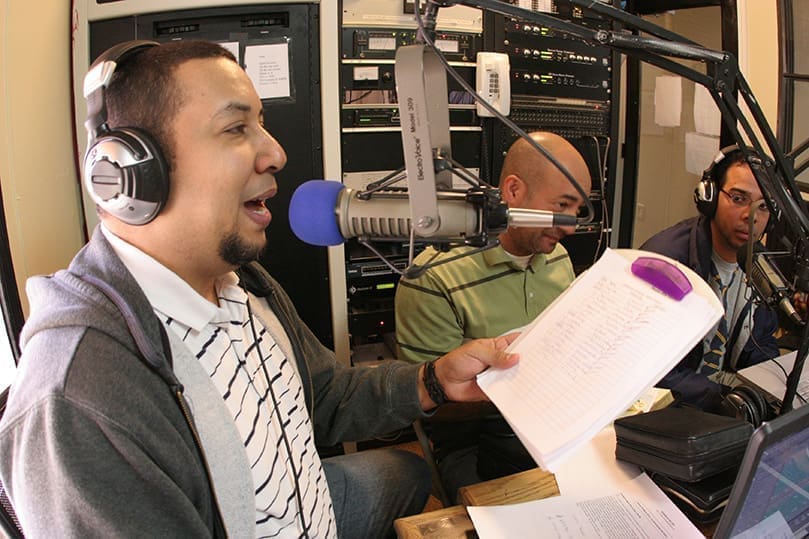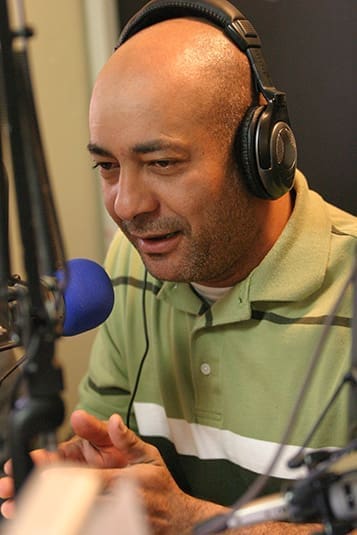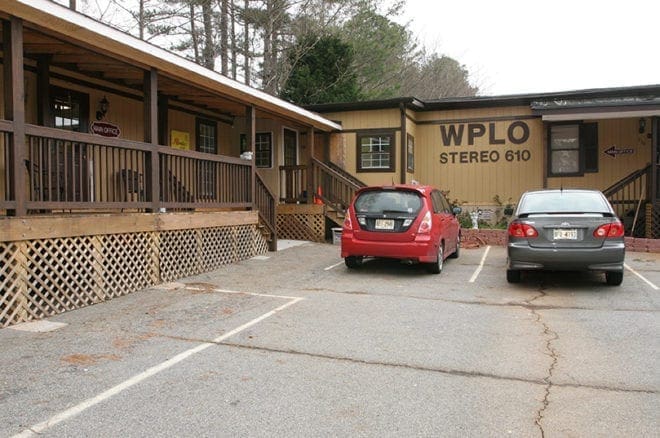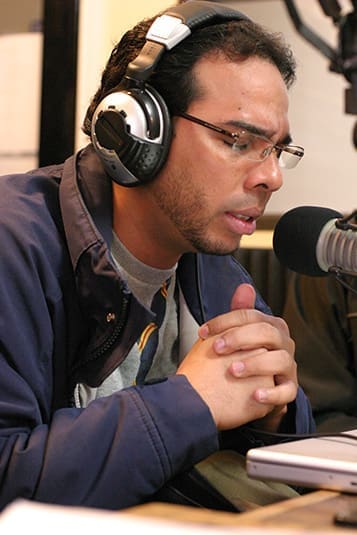 Photo By Michael Alexander
Photo By Michael AlexanderLawrenceville
Archdiocese Ventures Into Hispanic Radio
By ANDREW NELSON, Staff Writer | Published April 29, 2010
With an enthusiastic “Buenos dias!” the Spanish Catholic radio program went live on the air.
The four hosts, a mix of radio veterans and novices, a priest and laymen, sat knee to knee in the small studio. They prayed, read the Gospel, laughed, sang and answered callers during the hour show.
“There are a lot of non-Catholics listening, and they love the show,” said Juan Diaz, 36, who with nearly five years in radio is the most experienced behind the microphone.
The daily show, “Neustra Fe” (“Our Faith”), is an initiative by the Atlanta Archdiocese to reach the Hispanic community. By some estimates, upwards of 50,000 Latinos attend Catholic churches on Sundays around Atlanta. That leaves an estimated 300,000 who are not in the pews despite coming from heavily Catholic countries, said Jairo Martinez, the Hispanic ministry director for the archdiocese. The surge of Latinos in North Georgia is one reason for the growth of the Catholic Church here.

Jose Caceres shares a reflection with listeners on the feast of the Annunciation of the Lord, March 25. Caceres, a plumber by trade, is a member of Our Lady of the Americas Mission, Lilburn. Photo By Michael Alexander
The church is taking its message to places it hasn’t been before. A Catholic Mass is now part of the regular programming at the Atlanta Interfaith Broadcasters, a local cable TV channel. And thousands of drivers on Atlanta’s Downtown Connector highway see billboards promoting the church’s support for marriage and life issues.
The radio station for 610 AM WPLO Grayson/Atlanta, home for Our Faith, is a modest building tucked behind a mobile home park on the edge of Lawrenceville’s historic district. Its broadcast covers Gwinnett County and some 43 other counties in North Georgia, the hub of the Latino community in Georgia, according to the U.S. Census Bureau.
Teresa Esquivel, the station owner and lifelong Catholic, said she wanted a program with a priest as a co-host that could uplift the Latino community.
“I have the conviction that it is reaching the audience that I consider the most vulnerable,” she said.
The station recently changed its format from Protestant religious programming. Esquivel said that as a Mexican-American she has a devotion to the Blessed Mother and it bothered her the other religious programs did not support that part of the faith.
Now the station plays popular Latin music from the 1970s, 1980s and 1990s. It attracts listeners in the 25-to-54 age group. Esquivel said the spike in phone calls to the station shows her it is attracting an audience, but she is waiting for advertisers to catch up.
On this Thursday, it was the feast of the Annunciation. People called in to talk about how God appears to them in their daily lives in unexpected events.
Seven callers from Cumming to Athens and from Gainesville to Tucker called in. With only 30 minutes of the show with open phone lines, many callers never get on the air.
At the oversized microphone was Father José Luis Hernández Ayala, who works at St. Joseph Church in Dalton. He worked in radio and TV in his native Puerto Rico before ordination.
“If they give me permission, I’ll do this 24-7,” he said, laughing.

WPLO 610 AM, Lawrenceville, is the site of the daily Spanish Catholic radio broadcast, which can be heard in the morning between 10 and 11 a.m. Photo By Michael Alexander
Father José, who was ordained in May 2006, said he was the “instigator” with archdiocesan officials, pestering them to take up this ministry. Protestant churches are in the forefront of using mass media to reach new audiences, he said, but Catholics tend to be too cautious to get involved.
This program runs against that caution and that is why the audience think it’s great, he said.
“We reach people who are believers, lapsed Catholics, Protestants. We reach more people outside the parish boundaries,” he said.
Father José said the program always makes a point to say the name of the nearest church to the caller and lets them know what is happening at the church in the caller’s backyard.
The radio show has been on the air for three months now.
“We have a whole variety of people who call. People are listening,” Father José said.
Radio is a primary medium for Hispanics, according to Arbitron, a media and marketing research firm. A Hispanic person listens to the radio close to 15 hours a week, according to Arbitron.
One Hispanic radio report found the average listener to a religious format is 41 and female. Time spent listening to Spanish religious stations among the listeners 12-34 years old is the second highest radio format, according to Arbitron.
Jose Caceres, 42, is a plumber by trade, but he got involved in radio to bring the gospel to people who know nothing about God or about the church.

After giving a homily in the first half of the program, Father José Luis Hernández, parochial vicar at St. Joseph Church, Dalton, concludes the radio program with a prayer over the airwaves. Father Hernández has been an on-air contributor every Thursday morning since the beginning of the year. Photo By Michael Alexander
He said the radio’s mission is important because many Latinos are Catholic in their native country, but here without the community support, people get lonely and go to any church or none.
Interacting with listeners is a novelty for Diaz, the veteran radio announcer.
He manages an online Catholic radio program called Radio Kerigma. The Web site got some 3.7 million hits last year, he said.
But a difference he’s found with Our Faith is that he is more likely to run into a listener.
His online program gets listeners from around the world. On the air, the callers are all local, and there is a chance he will run into a listener at parish events.
Diaz gets a small stipend for this work, which takes him about three hours to prepare for a one-hour show.
He said he has learned the value of using radio to spread the faith.
“You can go to thousands of people at one time,” said Diaz.